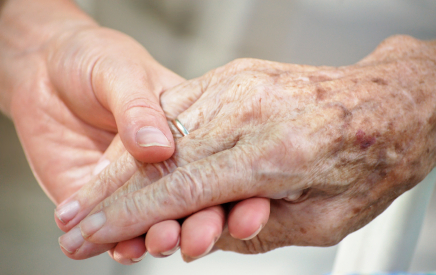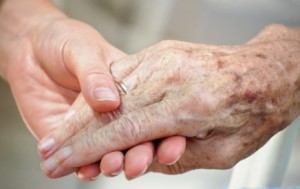Category: Depression/Mental illness/Substance Abuse
Posted by Dr. El - August 11, 2013 - Common Nursing Home Problems and How Psychologists Can Solve Them, Depression/Mental illness/Substance Abuse, McKnight's Long-Term Care News, Psychology Research Translated, Resident care, Stress/Crisis management

Here’s my latest article at McKnight’s Long-Term Care News:

According to researchers, 11% to 43% of LTC residents have thoughts of suicide1-3, with higher rates in larger facilities and in those with more staff turnover4. Other stressors include medical illness, the presence of a mood disorder such as depression, social isolation, and recent life stressors5 – factors that frequently affect our residents.
The MDS 3.0 requires that facilities ask residents questions regarding their risk of suicide. If a risk is identified, then effective protocols should be employed. In a June 2013 Annals of Long-Term Care review article, Challenges Associated with Managing Suicide Risk in Long-Term Care Facilities6, authors O’Riley, Nadorff, Conwell, and Edelstein offer alternatives to the procedures frequently in place in LTC settings – close observation or transfer to a psychiatric facility. These methods are often used unnecessarily, the authors note, due to staff fear of legal liability, concerns regarding their perceived competence in handling suicide risk, and the personal fear of losing a resident to suicide.
Essential for immediate risk
The authors argue that while close observation and hospitalization are essential when residents have the means, intent, and ability to end their lives at any moment (high risk situation), they’re ineffective in situations where there is a minimal or low risk of imminent death by suicide. For example, a resident may express thoughts of suicide but have no access to a means to do so or no ability to make use of an available means, making suicide very unlikely or virtually impossible. Other times a resident may have thoughts of suicide but no plans to do it any time soon. “If things get worse down the road,” they’ll sometimes say, “then I’m going to end it all.”
Ineffective for minimal risk
While a low or minimal risk should still be taken seriously, there is no evidence that it’s effective to put a resident on 15-minute checks or to send him or her to the psychiatric hospital.
For the entire article, visit:
 1.Haight B K. Suicide risk in frail elderly people relocated to nursing homes. Geriatr Nurs.1995;16(3):104-107.
1.Haight B K. Suicide risk in frail elderly people relocated to nursing homes. Geriatr Nurs.1995;16(3):104-107.
2. Malfent D, Wondrak T, Kapusta ND, Sonneck G. Suicidal ideation and its correlates among elderly in residential care homes. Int J Geriatr Psychiatry. 2009;25(8):843-849.
3. Ron P. Depression, hopelessness, and suicidal ideation among the elderly: a comparison between men and women living in nursing homes and in the community. J Gerontol Soc Work. 2004;43(2-3):97-116.
4. Osgood NJ. Environmental factors in suicide in long-term care facilities. Suicide Life Threat Behav. 1992;22(1):98-106.
5. Conwell Y, Van Orden K, Caine ED. Suicide in older adults. Psychiatr Clin North Am. 2011;34(2):451-468.
6. O’Riley A, Nadorff MR, Conwell Y, Edelstein B. Challenges associated with managing suicide risk in long-term care facilities. Annals of Long-Term Care. 2013;21(6):28-34.
Posted by Dr. El - April 17, 2013 - Dementia, Depression/Mental illness/Substance Abuse, McKnight's Long-Term Care News, Resident care


Here’s my latest column at McKnight’s Long-Term Care News:
I was hoping not to have occasion to write another column about tragedy so soon, but the terrible events at the Boston Marathon have prompted another look at how we deal within our facilities with distressing news.
In my previous article, Helping Your LTC Community Cope in the Wake of Hurricane Sandy, I offer post-disaster recommendations that are applicable in this situation. In this column, I focus on the amount of information we provide to residents about distressing outside events.
Sandy Hook
An aide was the first person who informed me about the shootings at Sandy Hook Elementary School last December, calling me into the dining room to see the news broadcast. “Children,” she said, “just little children. This is awful.” The TV was filled with images of horror and the dining room was filled with residents, all of who were in wheelchairs or recliners and most of whom had dementia. They were more or less trapped in there, watching repetitive distressing reports of a vulnerable population being inexplicably attacked.
Many residents talked about the children in their psychotherapy sessions that week. Staff members stopped me in the halls to comment and to be heard and comforted by the psychologist. My daughter is six years old, the same age as most of the Sandy Hook victims. I was present at work as needed and at home I skimmed the headlines and tried not to read the details.

Posted by Dr. El - April 8, 2013 - Business Strategies, Communication, Customer service, Depression/Mental illness/Substance Abuse, Engaging with families, McKnight's Long-Term Care News, Resident care


Here’s my latest column at McKnight’s Long-Term Care News:
I have great respect for those who attend to the often complicated physical needs of our long-term care residents, but if your facility doesn’t have a solid social service department, it isn’t as good as it could be. Yes, the medical care is vital, but the social service department addresses many of the issues essential to resident satisfaction.
Market researcher Margaret A. Wylde, PhD, notes that the three most important elements of satisfaction with a long-term care community are the friendliness of staff, the degree to which residents feel the community is their home, and the opportunity they have to stay connected with the rest of the world.
In her 2010 McKnight’s Online Expo talk, she stated that it’s very satisfied residents who refer others to their communities.
Consider the multitude of tasks the average social worker performs:
· Helps the resident settle into the facility
· Handles roommates conflicts
· Facilitates room changes
· Assists with the purchase of new clothing
· Locates or arranges for reimbursement of lost clothing
· Facilitates the signing of financial forms
· Explains and establishes advance directives

Posted by Dr. El - March 12, 2013 - Common Nursing Home Problems and How Psychologists Can Solve Them, Depression/Mental illness/Substance Abuse, McKnight's Long-Term Care News, Resident care, Role of psychologists

I’m very pleased to announce the debut of my new column at McKnight’s Long-Term Care News. The World According to Dr. El is a twice monthly column that will address mental health issues in LTC.
Please visit and “Like” the page on McKnight’s to show your support for addressing the mental health concerns of all those involved with LTC.

Inside the mind of an LTC shrink
I sat in morning report as the nursing supervisor announced the arrival of a new resident. An 80-year old woman was taken to the hospital after a fall at home, where she received a below-knee amputation and contracted C. diff before being transferred to our facility.
I looked around the room and speculated about what each of my team members were thinking, imagining thought bubbles over their heads:
- The wound care nurse was wondering how the leg was healing.
- The rehab director was considering the chances an 80-year old woman might be able to manage on a prosthetic leg.
- The infection control specialist was mentally reviewing a checklist of infection control procedures that needed to be put in place.
- The social worker was hoping the woman lived in a ground-floor apartment.
What was I thinking about this new admission? I was worried she might be suffering from symptoms of Post-Traumatic Stress Disorder if she had been alone on the floor for any length of time after her fall.
I pondered how she might be handling the assault on her femininity of losing a leg. I wondered about the quality of her family supports and whether she’d consider attending the choir performance where one of the soloists was a glamorous amputee from the third floor.
Posted by Dr. El - October 24, 2012 - Business Strategies, Common Nursing Home Problems and How Psychologists Can Solve Them, Customer service, Depression/Mental illness/Substance Abuse, Talks/Radio shows

Where was I last week and why didn’t I update my blog as usual? I was in Denver, speaking about Mental Health in Nursing Homes at the National Aging Services Risk Management conference sponsored by Caring Communities, Peace Church Risk Retention Group, and ECRI Institute. I addressed the fact that facilities are exposing themselves to multiple risks if they aren’t providing appropriate mental health care, and I offered practical, low- or no-cost ideas on how to improve mental health treatment in long-term care settings. The talk was recorded and will be available to ECRI Institute members at their website: ecri.org. In their words: ECRI Institute is an independent, nonprofit organization that researches the best approaches to improving the safety, quality, and cost-effectiveness of patient care.

Posted by Dr. El - July 26, 2012 - Common Nursing Home Problems and How Psychologists Can Solve Them, Depression/Mental illness/Substance Abuse, Resident care, Role of psychologists


The New York Times New Old Age blog has an interesting, hopeful article by Paula Span regarding treatment for depression in older adults. Regarding the stigma of psychotherapy the article mentions, I’ve found nursing home residents to be very receptive to my visits, especially when I phrase my help as “extra support during a stressful time.” Everyone agrees that entering a nursing home is stressful. (See my earlier post, The Stress of Nursing Home Admission, for more on this.) Occasionally, when someone is resistant but I can tell they need me, we postpone the decision to officially start psychological services and I tell them I’ll “just stop by next week to see how things are going.” Nine times out of ten, they’re glad to see me and appreciative that I showed up when I said I would.
Here’s the start to the New Old Age post; click on the title below to read the whole article:
Anna Hill’s mother-in-law had suffered from depression for years, it was clear in hindsight, and had denied it for years, too. Only 73, she’d lost interest in doing much of anything. In chronic pain after an earlier accident, she was taking high doses of methadone. Last November, she stunned her family by declining, at the eleventh hour, to come to Thanksgiving dinner.
“I’d only seen her in a nightgown for a year straight,” said Ms. Hill, 42, an accountant in Atlanta. “She was just rotting away in bed, watching TV and taking methadone.”
Depression in the elderly is a mixed picture these days.
For years, mental health specialists lamented that depression was seriously underdiagnosed and undertreated in the elderly. Laypeople saw it not as a disease but as an inevitable part of aging. Doctors missed it because depression didn’t always look the way it did in younger patients — less sadness and weepiness, more physical symptoms and disengagement. Older people themselves often rejected help because mental illness carried a stigma.
In primary care practices, Dr. Jürgen Unützer and colleagues found in a large study published in 2000, only 12 to 25 percent of older people with probable depression were getting a diagnosis and being treated.
Not anymore. Over the past decade, “we’ve seen a really big increase in the recognition of depression and the initiation of treatment,” said Dr. Unützer, a geriatric psychiatrist now at the University of Washington.
For more, click on title of article above.
Posted by Dr. El - July 20, 2012 - Depression/Mental illness/Substance Abuse, Resident care, Role of psychologists

 It was previously thought that seniors who are anxious about falling tend to avoid activities that could lead to falls, thus becoming de-conditioned and increasing fall risk. New research, however, suggests that anxiety about falling itself can increase fall risk. Hadjistavropoulos, T. et al. asked older adults to walk either in a low anxiety situation (on the floor) or a high anxiety situation (on an elevated platform). Those who were more anxious (measured through heart rate, self-report, etc) had a less stable gait. In addition, those who were multi-tasking by carrying a tray had a less stable gait. The self-report of anxiety about walking was predictive of balance performance — in other words, if they said they were nervous about falling, they didn’t walk as well.
It was previously thought that seniors who are anxious about falling tend to avoid activities that could lead to falls, thus becoming de-conditioned and increasing fall risk. New research, however, suggests that anxiety about falling itself can increase fall risk. Hadjistavropoulos, T. et al. asked older adults to walk either in a low anxiety situation (on the floor) or a high anxiety situation (on an elevated platform). Those who were more anxious (measured through heart rate, self-report, etc) had a less stable gait. In addition, those who were multi-tasking by carrying a tray had a less stable gait. The self-report of anxiety about walking was predictive of balance performance — in other words, if they said they were nervous about falling, they didn’t walk as well.
What does this mean for those of us working in LTC?
- We might consider formally or informally assessing the anxiety level of residents regarding their ability to walk.
- If residents appear anxious or report anxiety about falling, rehab therapists could discuss this with them or refer them for psychological services to address the issue. I frequently talk with residents about the circumstances around their falls and ways to avoid a repeat of the mishap, helping them to feel more in control and reducing anxiety.
- We can advise residents to focus on moving safely about their rooms (or homes upon discharge), rather than on carrying objects from one point to another.
Posted by Dr. El - December 14, 2011 - Depression/Mental illness/Substance Abuse, Resident care

“I watched them take my father into the ambulance on a stretcher, and it was then I realized that my mother didn’t make it.” The TV was blaring as I entered the room for my session with Grace, who was being treated for depression.
“WHAT are you listening to?” I asked Grace incredulously, feeling my mood dip from 30 seconds of viewing the show.
“It was on,” she replied.
“Grace, you’ve got to be careful. I don’t know if you’ve noticed, but living in a nursing home can be a little bit depressing.” She smiled at my intentional understatement. “You’ve got to balance life here with happy things. I never watch shows like this because they make me depressed. Although…there was the time when I was feeling sad after the breakup of a long relationship and I rented the movie Alive. You know, the one where the airplane crashes and the people have to eat each other to survive.”
Grace nodded. “I remember.”
“Yeah, I figured, by comparison, my life was going great.”
Graces’s laughter filled the room, and I shut off the TV to take it in.

Posted by Dr. El - October 5, 2011 - Customer service, Depression/Mental illness/Substance Abuse, Talks/Radio shows, Younger residents

 Will you be in Toronto on October 19th, 2011? Come hear Dr. El speak at the annual convention of the Activity Professionals of Ontario.
Will you be in Toronto on October 19th, 2011? Come hear Dr. El speak at the annual convention of the Activity Professionals of Ontario.
Participants will learn:
- How we react to working with younger residents, and how younger residents react to us as staff members.
- How to use this knowledge to create healthy resident/staff relationships, free of disruptive conflicts.
- What types of activities work best with this population.
- How to create a nursing home environment where younger people thrive.
Want Dr. El to speak at your next event? Call 718-218-DrEl (3537) or Click on the Contact Page
Posted by Dr. El - May 16, 2011 - Depression/Mental illness/Substance Abuse, Psychology Research Translated
“Excuse me,” I said to the lady sitting across from the nursing station. “We’ve been saying hello for a while. I’m Dr. Barbera, the psychologist. You’re Ms. Patel, right?”
“Yes, that’s right.” She looked up at me from her wheelchair and smiled. “Nice to meet you.”
“You too. Listen, I wanted to ask you a favor. It’s perfectly okay if you say no, because not everyone is comfortable with this, but I’m trying to find a place to meet in private with a neighbor of yours and her roommate is in her room. I was wondering if I might be able to sit and chat with her for a few minutes in your room, since you’re out here. We wouldn’t touch anything, we’d just sit and talk.”
“Oh absolutely, honey!” Her face lit up and she waved her good arm in the direction of her private room. “Any time. You don’t even have to ask.”
“Really? That’s very kind of you. Sometimes it’s hard to find a quiet space.” I don’t think I’d be quite so generous if the circumstances were reversed. On the other hand, perhaps other staff members would be using my room without permission, and I’d be so pleased someone had actually asked that I’d give them carte blanche. Maybe I’d be mellower in my older years…nah, I don’t think so. I’d want to be asked every time.
_______________________________________________
A study in the October-December 2010 Clinical Gerontologist looked at “The Effect of Helping Behavior and Physical Activity on Mood State and Depressive Symptoms of Elderly People.” The participants lived in senior housing, had mild physical and cognitive disabilities, and had an average age of 78. The researchers found that “helping behavior was positively correlated with cheerfulness and vigor” and “negatively correlated with depressive symptoms.” In other words, helping others made these seniors feel happier, more energetic, and less depressed.
Would helping others benefit our residents, who tend to be older and more impaired? Yes! We just have to create opportunities for success. In this case, I:
- picked someone who was friendly, in a good mood, and whom I thought was likely to say yes without later resentment or suspiciousness
- asked a favor that didn’t cost anything
- gave the opportunity for an “easy out” by providing the words to say no: “not everyone is comfortable with this.”
How have you helped residents help others? What was their reaction?


 1.Haight B K. Suicide risk in frail elderly people relocated to nursing homes. Geriatr Nurs.1995;16(3):104-107.
1.Haight B K. Suicide risk in frail elderly people relocated to nursing homes. Geriatr Nurs.1995;16(3):104-107. 











 It was previously thought that seniors who are anxious about falling tend to avoid activities that could lead to falls, thus becoming de-conditioned and increasing fall risk. New research, however, suggests that anxiety about falling itself can increase fall risk.
It was previously thought that seniors who are anxious about falling tend to avoid activities that could lead to falls, thus becoming de-conditioned and increasing fall risk. New research, however, suggests that anxiety about falling itself can increase fall risk. 


 Will you be in Toronto on October 19th, 2011? Come hear Dr. El speak at the annual convention of the
Will you be in Toronto on October 19th, 2011? Come hear Dr. El speak at the annual convention of the 